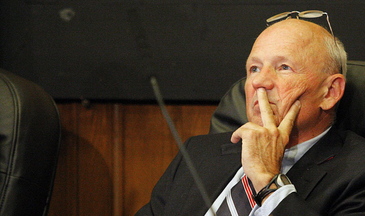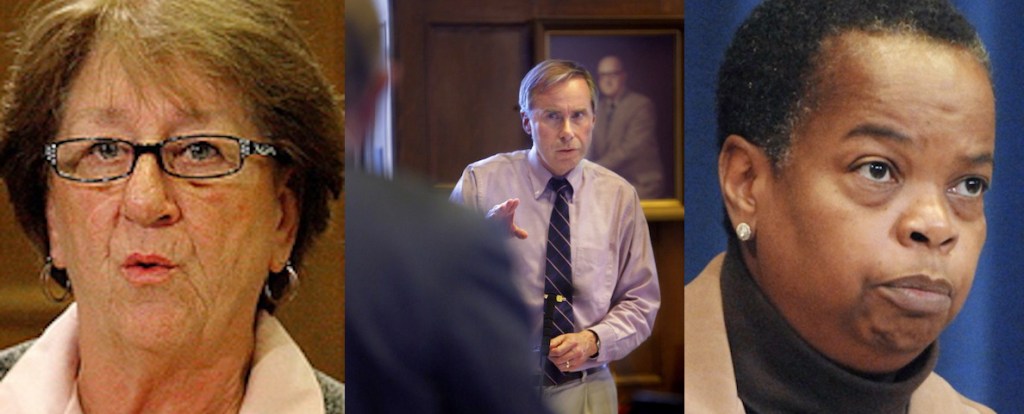PORTLAND — Some city councilors think Mayor Michael Brennan has too much power in setting council meeting agendas, and have complained that their ideas have gone to subcommittees instead. Brennan dismisses the criticism as a non-issue.
The disagreement, revealed in civil email exchanges obtained by the Portland Press Herald, is the first public sign of tension between the council and Brennan, and shows that, two years after Portland voters chose their mayor for the first time in 88 years, he and the City Council are still struggling to define their roles as policy makers.
The council’s Nominating Committee will take up the question of agenda-setting authority on Thursday.
The issue came to light after the city attorney, Danielle West-Chuhta, sent a legal memo to councilors saying that the mayor has the power to deny councilors’ requests for issues to be taken up at meetings. Her interpretation of the city charter is at odds with council rules that allow individual councilors to put items on the agenda as long as the request is made a week before the meeting.
When voters adopted the city charter in 2010 to establish a popularly elected mayor, the position was viewed as way to set a policy direction for the city. To foster that, the charter says the mayor has the authority to “direct the city manager in the preparation of the council meeting agendas.”
Some councilors view the charter as making the mayor the scheduler in chief, rather than the final arbiter of whether the council takes up any given issue.
“This is not one-man rule; this is representative government,” said Councilor Cheryl Leeman, who chairs the Nominating Committee.
Last month, Councilor Jill Duson sponsored a resolution asking the committee to clarify the issue.
Brennan downplayed the disagreement about his authority.
“I don’t think this has been an issue since I have been mayor,” said Brennan, who would not discuss the importance of having authority to set the council’s agenda.
Councilor John Anton said the disagreement shows the city is still sorting out a relatively new way of doing business.
“When you’re sorting it out, people aren’t happy,” he said. “It’s hard for me to determine whether it’s structure- or personality-driven.”
Councilor Kevin Donoghue, who serves on the Nominating Committee, declined to discuss the issue with a reporter.
“I am disappointed that mayor-council communication has come to this,” he said in an email, without elaborating.
While agenda-setting may seem like a mundane topic, councilors see it as an important way to show constituents that they are being responsive to their concerns.
Councilor Edward Suslovic said access to the council agenda must be “clear, consistent and transparent,” not only for councilors, but for residents as well.
He noted that the pending proposal for a buffer zone to keep anti-abortion protesters at least 39 feet from Planned Parenthood of Northern New England’s clinic went straight to committee without first appearing on the council’s agenda.
He said he would like the council to take up a resolution for the city manager to set goals for buying renewable energy, but there is confusion about how to proceed.
“If you’re a member of the public trying to follow an issue, you tend to look at the City Council agenda first before you would look at each committee agenda,” Suslovic said. “You want clear, understandable rules that are public.”
Duson downplayed the disagreement in a recent interview. But she expressed concern that giving the mayor the ability to deny a councilor access to the agenda amounts to a “pocket veto.”
“Someone who has an issue they want the council to take up shouldn’t have to convince first a single member that it is worthy of placing on the agenda,” Duson said.
Documents reviewed by the Press Herald show that Brennan first expressed his agenda-setting authority in February, in a memo to councilors.
“Over the past year, several issues have surfaced related to how the council conducts business that I have been asked to clarify,” Brennan wrote.
He told councilors to run agenda requests through him, and called out councilors for leaving the chamber before votes.
The issue arose again in July, when Leeman requested an agenda item relating to fire sprinklers. She wanted the council to direct one of its committees to review residential sprinkler requirements. She says Brennan denied that request and sent the matter straight to committee.
“I just wanted to flag it as a public issue to let people know I was being responsive to a constituent concern,” Leeman said in an interview. “I got an emphatic ‘No.’ ”
A month later, West-Chuhta sent an email to Suslovic outlining her interpretation of the city charter. She noted that the mayor’s power to set the agenda divided the commission that wrote the charter, but was ultimately approved.
At the request of City Manager Mark Rees, West-Chuhta’s memo was sent to all councilors, prompting a response from Duson, who asked that the council discuss the issue.
“I think it would be best if we talked about your request,” Brennan replied in an email to Duson on Aug. 29.
“I quite understand that you may think it best that we talk about this agenda item. However, this is a pretty straightforward division-of-power dispute that needs to be hashed out in the light of day, on the public record,” Duson replied on Aug 30.
On Sept. 4, Duson sent another email to Brennan, thanking him for a “thorough discussion” and reiterating her request to have the council take up the issue.
That prompted an encouraging reply from Leeman: “You go girl!!!”
Randy Billings can be contacted at 791-6346 or at:
Twitter: @randybillings
Send questions/comments to the editors.





Success. Please wait for the page to reload. If the page does not reload within 5 seconds, please refresh the page.
Enter your email and password to access comments.
Hi, to comment on stories you must . This profile is in addition to your subscription and website login.
Already have a commenting profile? .
Invalid username/password.
Please check your email to confirm and complete your registration.
Only subscribers are eligible to post comments. Please subscribe or login first for digital access. Here’s why.
Use the form below to reset your password. When you've submitted your account email, we will send an email with a reset code.